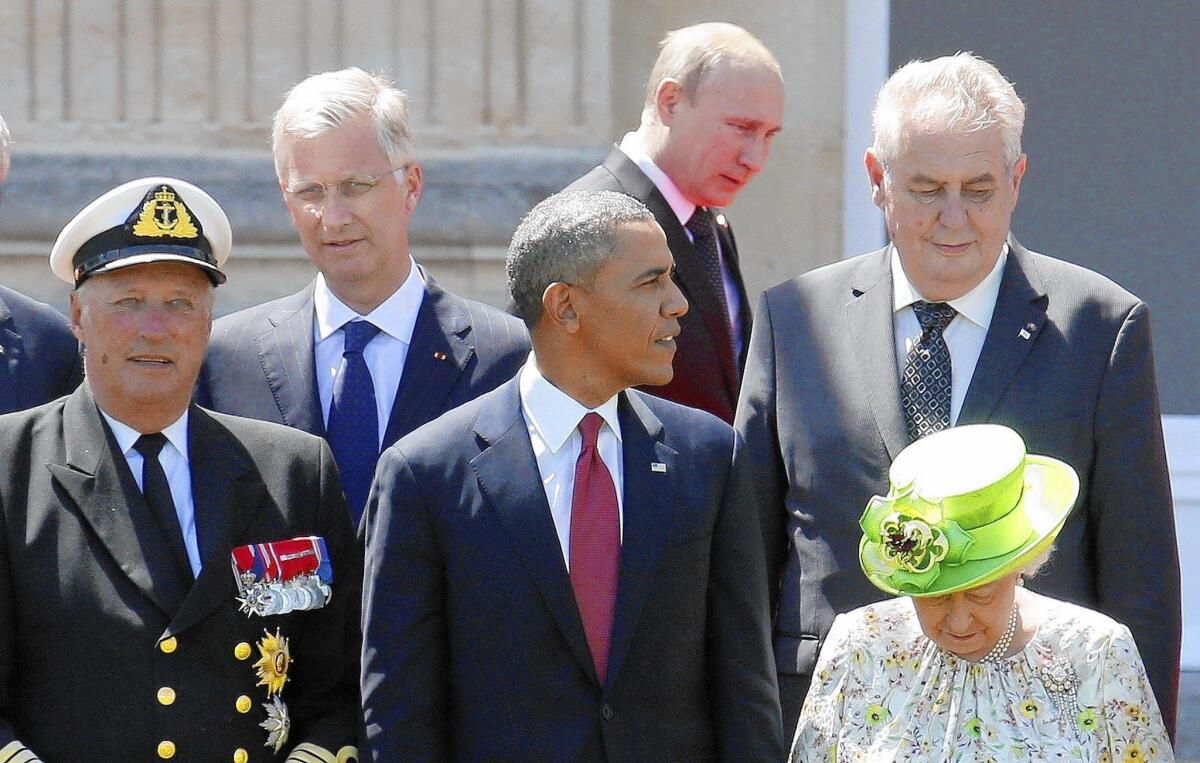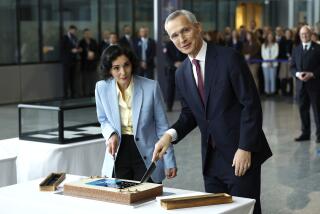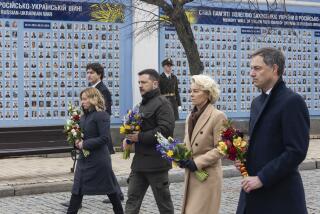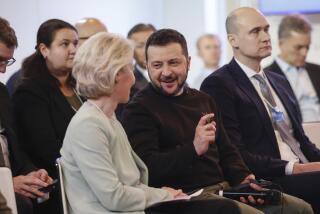Obama, Putin talk briefly at D-day 70th anniversary event

Under the pall of another territorial crisis in Europe, President Obama and a cast of world leaders tried to set aside grievances Friday to commemorate the common cause and military might that turned the tide of war against global oppression seven decades ago.
As jets flew missing-man formations and guns fired booming salutes, Obama joined more than a dozen world leaders — including European heads of state; Britain’s Queen Elizabeth II; and Obama’s current rival on the world stage, Russian President Vladimir Putin — for emotional ceremonies on the 70th anniversary of the D-day landings.
Speaking in a cemetery for U.S. servicemen killed during the invasion, Obama recalled how more than 160,000 U.S. and Allied troops stormed ashore and yet failed to capture any of their major objectives on that first, longest day. The months-long Battle of Normandy ultimately resulted in more than 425,000 Allied and German casualties.
“We say it now as if it couldn’t be any other way. But in the annals of history, the world had never seen anything like it,” Obama said, looking out over nearly 10,000 American grave markers on the cliffs overlooking Omaha Beach.
Hundreds of veterans and their families came, several sitting behind the president in old military uniforms, theirs hands resting on canes. When Obama expressed his thanks for their service, they rose slowly, if they could, to accept the applause.
Amid the tributes to the young men who faced and fell to withering fire on the beaches and bluffs here, private conversations focused on more current violence.
In a secluded chateau between ceremonies, Obama and Putin huddled by a doorway for their first face-to-face conversation since Russia annexed Ukraine’s Crimean peninsula in March. Some say the land grab carries uncomfortable echoes of the border-crossing aggression that Moscow and Washington joined forces to defeat in World War II.
The then-Soviet Union suffered an estimated 24 million dead, more than any other country in the war. About 420,000 Americans were killed.
The Obama-Putin meeting Friday was brief and unscripted, the White House said, lasting about 15 minutes after a lunch hosted by French President Francois Hollande. But it marked another twist in the drama-filled relationship between two leaders with no love lost and no way to work around each other.
According to Ben Rhodes, the U.S. deputy national security advisor, Obama urged Putin to recognize the newly elected president of Ukraine, Petro Poroshenko, as the legitimate leader, “ceasing support for separatists in eastern Ukraine, and stopping the provision of arms and materiel across the border.”
Rhodes said Obama “made clear that a failure to take these steps would only deepen Russia’s isolation.”
TV footage of the pair talking suggested that Putin appeared to interrupt Obama at times, although it’s unclear what he said.
Just before they met, Putin was seen talking to Poroshenko at the lunch. The two leaders spoke briefly, standing on each side of German Chancellor Angela Merkel.
Officials later said Putin and Poroshenko discussed arranging a formal cease-fire in eastern Ukraine, where gun battles between government forces and Russian-backed separatists have claimed scores of lives, as well as other steps to ease tensions.
“They spoke out in favor of the soonest stop to the bloodshed … and also of the cessation of hostilities,” Putin’s spokesman, Dmitry Peskov, told Itar-Tass, a Russian news service. “Besides, a lack of alternative to a peaceful political settlement was confirmed.”
A Poroshenko spokeswoman, Irina Friz, gave further details on her Facebook page. She said negotiations would start Sunday for a plan to take joint action to “prevent constant Ukrainian border crossing by Russian militants,” among other goals.
A senior Obama administration official, who briefed reporters later on condition he not be identified, called the discussion “a positive development” but not a substitute for Putin formally recognizing Poroshenko’s election.
The official said Ukraine’s election “provided for a new basis of legitimacy for the government. It provides a new interlocutor” for Putin. “There is a window open here.”
U.S. and European leaders initially vowed to isolate Russia politically and economically, hoping that sanctions and other pressure would persuade Putin to stop aiding separatists in other parts of eastern Ukraine.
Now, with Putin pulling troops off the Ukrainian border and a newly elected leadership in Kiev, White House officials say they’re no longer trying to ramp up pressure but are still working at persuading Putin to take other steps.
That requires engaging with Putin. Even as the U.S. and Europeans shut the Russian leader out of the Group of 7 industrial nations’ summit Thursday in Brussels, Obama watched three of his closest allies — France’s Hollande, Germany’s Merkel and British Prime Minister David Cameron — book their own private sessions with Putin.
Publicly Obama and Putin showed no signs of warmth under the watchful eyes of reporters Friday, as they were corralled with the rest of leaders for a group photo at the neoclassical estate that once harbored French resistance fighters.
They either kept at a distance, busy talking to others, or ignored each other when in close range. Obama spent time seeing to the 88-year-old British queen. Putin and Obama were not seated next to each other.
Obama could use a diplomatic breakthrough after months of watching his foreign policy agenda reel.
As he traveled across Europe this week, the president came under bipartisan criticism in Congress for exchanging five Taliban detainees from the U.S. military prison at Guantanamo Bay, Cuba, for an American prisoner of war in Afghanistan.
He spent much of the week reassuring nervous allies in Eastern Europe that he would honor U.S. commitments for a joint defense under the NATO treaty — a message aimed at Moscow but one that distracts from his vow to rebalance priorities toward Asia.
In his speech Friday, the president expressed a sort of nostalgia for the sense of purpose that drove the Allies to defeat the Axis powers. Today it has “never been more tempting to pursue narrow self-interest and slough off common endeavor,” he said.
He suggested that the public might not have tolerated the loss of life at Normandy — 2,499 American dead on the first day, more than have been killed in 13 years of war in Afghanistan — in today’s hyperconnected, hypercritical culture.
“In our age of instant commentary, the invasion would have been swiftly and roundly declared, as it was by one officer, ‘a debacle,’” Obama said. “But a race to judgment does not take into account the courage of free men.
“Whenever the world makes you cynical,” he said, “stop and think of these men.”
Times staff writer Sergei L. Loiko in Moscow contributed to this report.
More to Read
Start your day right
Sign up for Essential California for news, features and recommendations from the L.A. Times and beyond in your inbox six days a week.
You may occasionally receive promotional content from the Los Angeles Times.







